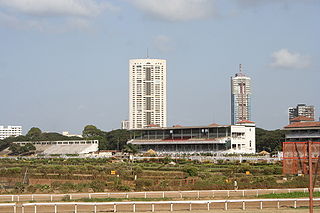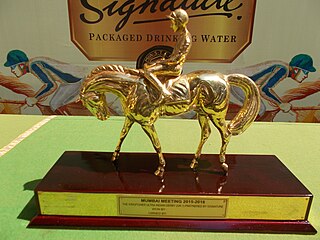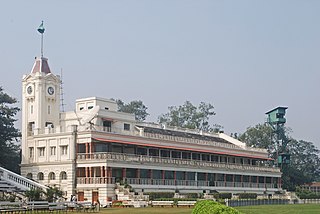
Mahalaxmi is an upscale, affluent neighbourhood in the city of Mumbai, India. It is known for Royal Western India Turf Club’s Mahalaxmi Racecourse with horse races every year having visitors from around the world. It is particularly well-known for housing the majestic Mahalaxmi Temple, dedicated to the Hindu goddess of wealth and fortune. Magnificent views can be had of Malabar Hill and the Arabian Sea, two well-known locations.
Byculla is an area of South Mumbai.
Mahalakshmi or Mahalaxmi may refer to Lakshmi, the Hindu goddess of wealth, fortune, fertility and prosperity; or to the fierce form of the goddess Durga which she took while protecting the world.

Mahalaxmi, also spelled Mahalakshmi, is a railway station on the Western Line of the Mumbai Suburban Railway in Mahalaxmi, Mumbai. Trains starting from Churchgate pass through Mahalaxmi. The next station south is Mumbai Central Station, while the next station north is Lower Parel Station. Major landmarks in the area are the Mahalaxmi Temple, Haji Ali Dargah, Nehru Planetarium and Mahalaxmi Racecourse Dabbawalla Statue. Worli Seaface is also close from here. Byculla station of the Central Railway is the closest station.

The Mahalaxmi Racecourse is a horse racing track in Mahalaxmi neighbourhood of Mumbai. The track is oval shaped with 2,400 metres (7,900 ft) straight chute, spread over approximately 225 acres of open land in the heart of Mumbai city. It was created out of a marshy land known as Mahalakshmi Flats. It was built in 1883 and the stands were modelled on the Randwick Racecourse in Sydney in 1922 by Sydney architect and racing administrator Theodore John Marks. It is spread over land facing the sea.
The Guindy Race Course is a horse racing course set up in 1777 in Chennai, India. It is the oldest race course in India. It hosts events in the winter season.
Pandu Khade was an Indian jockey who played in India and abroad.

The Royal Bombay Yacht Club (RBYC) is one of the premier gentlemen's clubs which was founded in 1846 in Colaba, an area of Mumbai in India. The building was designed by John Adams, who also designed the nearby Royal Alfred Sailors' Homes, and was completed in 1896.

Pesi Shroff is a former Indian champion jockey. He has ridden 5,614 races and won 1,751 of them, including 106 classic races and 29 Derbys. Born to a Parsi family, he began his career at 16 years old when he was licensed to ride by the Royal Western India Turf Club in Mumbai in 1981. He won his first race on My Squaw.

The Indian Derby is an annual Thoroughbred horse race. It is run over 2,400-metres and held on the first Sunday of February at the Mahalaxmi Racecourse in Mumbai.

Pune Race Course is a racecourse located in Pune Cantonment, western India. It is located 5–6 km from downtown Pune and 12–13 km from Pune airport. Built in 1830, it covers 118.5 acres (48.0 ha). The land is controlled by the Indian Army.

Popular games and sports in Pune include athletics, cricket, basketball, badminton, field hockey, football, tennis, kabaddi, paragliding, kho-kho, rowing and chess. The Pune International Marathon is an annual marathon conducted in Pune. The 2008 Commonwealth Youth Games were held in Pune.

The 17411/17412 Mahalaxmi Express is an express train belonging to Indian Railways that runs between Mumbai and Kolhapur in India. It is a daily service. It operates as train number 17411 from Mumbai CSMT to Kolhapur SCSMT and as train number 17412 in the reverse direction. Before gauge conversion, this train ran in two sections, with Sectional Carriage interchanged at Pune & later at Miraj, with timeline
Sports play an integral part of culture in the Indian state of Maharashtra. Cricket is the most popular spectator sport in the state. Other popular sports include kabaddi and kho kho, which are played in rural areas, and field hockey, badminton, and table tennis, which are more common in urban areas, schools, and colleges. In the state's southern rural regions, annual wrestling championships such as Hind Kesari and Maharashtra Kesari are held. Games like Viti-Dandu and variations of Tag are played among children.

The Royal Calcutta Turf Club (RCTC) is a horse racing organisation which was founded in 1847 in Calcutta, British India. Horse events and sports were initially organised for the British cavalry at Akra before they were moved to the Maidan. The RCTC became the foremost horse-racing organization in India during the British Raj. At one time it was the governing body for nearly all racecourses in the subcontinent, defining and applying the rules governing the sport. During its heyday, RCTC-organised races were among the most important social events of the bigwigs' calendar and were opened by the Viceroy of India. Still a private club, the RCTC operates Kolkata Race Course in the Maidan.

Sir Apcar Alexander Apcar was a wealthy Armenian businessman in Calcutta, India. His family had made their fortune in the opium trade with China. He was president of the Bengal Chamber of Commerce, sat on the Imperial Legislative Council, and in 1903 was knighted. He owned a racehorse stud, and for several years was the leading figure in the Indian racing world.

Horse racing in India is over 200 years old. The first racecourse in the country was set up in Madras in 1777. Today, India has a very well-established horse racing and breeding industry, and the sport is conducted on nine racetracks by six racing authorities.
Y. S. Srinath is a champion jockey from Bangalore who has ridden over 1250 winners, including 94 graded races. He was the first Indian Jockey to win more than 25 races outside of India and has won many important classics.
Rashid Byramji was an Indian horse trainer. He was popularly known as the "horse whisperer" of Indian horse racing. In a career spanning over six decades, Byramji held the records for 3,170 wins including 230 classics. He was the only trainer to have had 10 Indian Derby winners and 12 Indian Invitation Cup winners.












